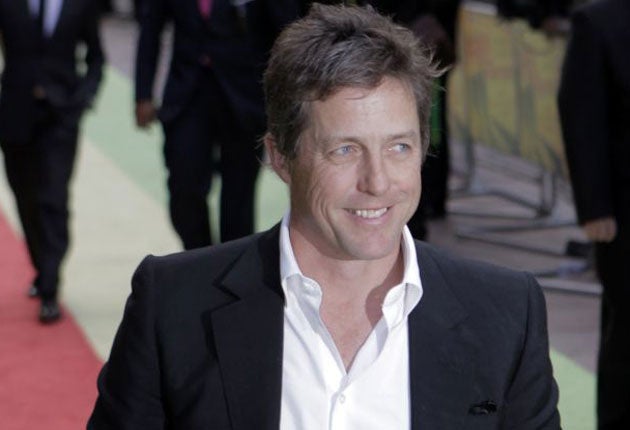Hugh Grant considers legal action after seeing 'phone-hacking evidence'

Hugh Grant said yesterday that an officer from Scotland Yard's Operation Weeting team investigating phone-hacking by the News of the World had visited him and shown him evidence of how he and his family had been targeted by the tabloid newspaper.
The actor said he was considering legal action against the paper, which is part of Rupert Murdoch's News Corp publishing empire. Speaking to the BBC Radio 5 Live presenter Richard Bacon, who was recording his show in the newsroom of The Independent, Grant said the Metropolitan police officer had led him to believe that "big heads will roll soon" at Murdoch's company.
He said he had been shown "the evidence; all these notes with my PIN numbers, my phone numbers, my friends', my family's phone numbers, PIN numbers, bank accounts, all written down by a private detective working for a paper". He said he believed the new investigation team were "hot on the criminal case" and that he found the development "exciting".
Days after actress Sienna Miller received £100,000 from the News of the World, following the paper's admission that it hacked her mobile phone, Grant said he had not yet decided whether to issue civil proceedings but that he was considering doing so.
The actor attacked tabloid newspapers, expressing the view that they were unnecessary and that he hoped they would be shut down. "I could list you hundreds of high-profile people in this country who feel the same way. We don't need them, we don't want them and as soon as they go out of business the better," he said.
"The tabloid press is completely unnecessary – at least in my industry – to what you do. You need to make a good film, that's 97 per cent of it; then about 2 per cent of it is having good advertising materials, good trailer etc and then right on the end make a bit of noise with publicity if you can. But almost no one will talk to the tabloids. They'll usually do it through radio or television or the internet."
He accused newspapers of "stealing someone's most precious commodity for profit" by invading their privacy and maintained: "There's nothing to do with public interest – it's purely to do with money."
The failure to rein in the intrusions of the tabloid press, he went on, provided a justification for the controversial super-injunctions. "Injunctions... are at least to be welcomed because something's being done," he said.
Grant, 50, also revealed that he had largely left the acting world. He said: "One of the reasons I feel so brave about speaking out now is I am pretty much retired." He said that if he were to win a libel case against one of the tabloids he would want the punishment meted out to the paper to be a ban on publishing anything more about him.
"So little do I need the tabloid press that if I won a libel case against a tabloid paper now I would not want cash; I would want an assurance that they would never ever mention my name again." he said.
Mr Grant said that a privacy law was required in Britain because of the decline in ethical standards of the tabloid press. "There are no ethics any more, there's only one motive and that's profit." He said that he valued privacy injunctions because, although they were "imperfect" and could be circumnavigated by online media, "at least something is being done".
Subscribe to Independent Premium to bookmark this article
Want to bookmark your favourite articles and stories to read or reference later? Start your Independent Premium subscription today.
